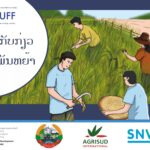
10 downloads
Title of document: Harvesting the fodder seeds (Lao language) Authors/editor: Agrisud International Journal’s name if any: Ministry/Government Agency/Organization: Agrisud International, SNV, SDC Year of publication: 2020 Geographic focus: Lao PDR Main issues/ topics addressed (for example: …) School of agroecology (if any): Web address to original document (if any): Summary: The first series of Master-Farmers booklets published on ALiSEA is to support the establishment and management of improved pastures for big livestock. Read More

21 downloads
Title of document: Planting fodder crops (Lao language) Authors/editor: Agrisud International Journal’s name if any: Ministry/Government Agency/Organization: Agrisud International, SNV, SDC Year of publication: 2020 Geographic focus: Lao PDR Main issues/ topics addressed (for example: …) School of agroecology (if any): Web address to original document (if any): Summary: The first series of Master-Farmers booklets published on ALiSEA is to support the establishment and management of improved pastures for big livestock. Read More

45 downloads
Title of document: The Lao Coffee Notebook Authors/editor: RURAS and Comma Coffee Journal’s name if any: Ministry/Government Agency/Organization: RURAS and Comma Coffee Year of publication: 2020 Geographic focus: Lao Main issues/ topics addressed (for example: Coffee Production, processing roasting and brewing, including a map, statistics…) School of agroecology (if any): Web address to original document (if any): https://laocoffee.org/2020/10/03/lao-coffee-notebook/ Summary: The Lao Coffee Notebook is now available! Produced by LURAS in cooperation with Comma Coffee, this unique notebook is packed with information about coffee production, processing roasting and brewing, including a map, statistics and a Lao-English wordlist, all of which has been beautifully illustrated by Tina at Helvetas. Read More
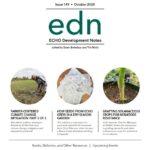
8 downloads
Title of document: ECHO Development Notes - Issue 149, October 2020 Authors/editor: ECHO Asia Journal’s name if any: Ministry/Government Agency/Organization: ECHO Asia Year of publication: 2020 Geographic focus: Asia Main issues/ topics addressed (for example: Farmer-Centered Climate Change Mitigation; A Seed Trial Report; Upcoming Event: ECHO International Agriculture Conference - ONLINE EVENT…) School of agroecology (if any): Web address to original document (if any): https://assets.echocommunity.org/publication_issue/e414df45-2f56-4112-a601-761992903acd/en/edn-issue-149.pdf Summary: In this issue: Farmer-Centered Climate Change Mitigation: Part 2 of 2 From ECHO's Seed Bank: How Seeds from ECHO Grew in a Dry-Season Garden in Uganda Echoes from our Network: Grafting Tamarillo and OtherSolanaceous Crops for Nematode Resistance Books, Websites, and Other Resources: AT Fair Summary Upcoming Event: ECHO International Agriculture Conference - ONLINE EVENT Read More
4 downloads
Title of document: Delivering on the Promise of Biological Control in Asia's Food Systems: A Humboldtian Perspective Authors/editor: Kris A. G. Wyckhuys, Mauricio González-Chang, Evie Adriani, Annabelle B. Albaytar, Alice Albertini, Gonzalo Avila, Marie Joy B. Beltran, Ariel D. Boreros, Muhammad Z. Fanani, Duc T. Nguyen, Giang Nguyen, Ihsan Nurkomar and Sundar Tiwari Journal’s name if any: Frontiers - Front. Sustain. Food Syst., 11 September 2020 Ministry/Government Agency/Organisation: Frontiers Year of publication: 2020 Geographic focus: Asia Main issues/ topics addressed (for example: …) School of agroecology (if any): Web address to original document (if any): https://www.frontiersin.org/articles/10.3389/fsufs.2020.00140/full#h1 Summary: During the late twentieth century, the “Green Revolution” attained wide-ranging poverty alleviation, food security and improved nutrition across rural Asia. As these achievements were often reached at large environmental costs, “greener” trajectories urgently need to be traced for Asia's agri-food systems. In this sense, agro-ecological and biodiversity-based (ABB) farming systems can provide sufficient food, lift resource-use efficiencies and lower fossil-fuel dependencies while safeguarding the environment. Here, we systematically assess past progress and prospects for biodiversity-based pest management -or biological control (BC)- in five Asian countries.… Read More
13 downloads
Title of document: Resolving the twin human and environmental health hazards of a plant-based diet Authors/editor: Kris A.G.Wyckhuys, Alexandre Aebi, Maarten F.I.J, .Bijleveld van Lexmond, Carlos R.Bojaca, Jean-Marc Bonmatin, Lorenzo Furlan, Jairo A.Guerrero, Trinh V.Mai, Hoi V.Pham, Francisco Sanchez-Bayo, Yoshinori Ikenaka Journal’s name if any: Environment International, Volume 144, November 2020, 106081 Ministry/Government Agency/Organisation: Year of publication: 2020 Geographic focus: Global level Main issues/ topics addressed (for example: Fruits and vegetables constitute core constituents of ‘planetary health’ diets…) School of agroecology (if any): Web address to original document (if any): https://www.sciencedirect.com/science/article/pii/S0160412020320365 Summary: Food can be health-giving. A global transition towards plant-based diets may equally help curb carbon emissions, slow land-system change and conserve finite resources. Yet, projected benefits of such ‘planetary health’ diets imperfectly capture the environmental or societal health outcomes tied to food production. Here, we examine pesticide-related hazards of fruit and vegetable consumption, and list proven management alternatives per commodity, geography and chemical compound. Across countries, pesticide use in these alleged healthful foods is extensive with up to 97% food items containing residues and up to 42% posing dietary risks to consumers… Read More
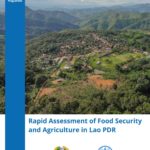
82 downloads
Title of document: Rapid Assessment of Food Security and Agriculture in Lao PDR Authors/editor: WFP, FAO, MAF Journal’s name if any: Ministry/Government Agency/Organisation: WFP, FAO, MAF Year of publication: 2020 Geographic focus: Lao PDR Main issues/ topics addressed (for example: markets, trade, investment, food security, nutrition…) School of agroecology (if any): Web address to original document (if any): Summary: While there have been just 19 confirmed cases of the Coronavirus Disease 2019 (COVID19) to date in Lao PDR, the country – as with other countries around the world – has been affected by secondary social and economic impacts as a result of measures instituted to stop the spread of the virus. This survey seeks to measure the impact of the crisis on food security and agriculture in order to identify bottlenecks and affected populations/provinces, and ultimately guide any required response… Read More
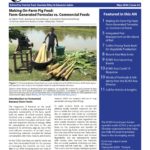
9 downloads
Title of document: ECHO Asia notes ISSUE 42/ 2020 Authors/editor: Patrick Trail, Daniela Riley & Eduardo Sabio Journal’s name if any: Ministry/Government Agency/Organisation: ECHO Asia Year of publication: 2020 Geographic focus: Asia Main issues/ topics addressed (for example: Making On-Farm Pig Feed: Farm-Generated Formulas vs. Commercial Feeds; Integrated Pest Management on the Island of Bali; Coffee Drying ‘Bunk-Beds’ for Vegetable Production…) School of agroecology (if any): Web address to original document (if any): Summary: Read More
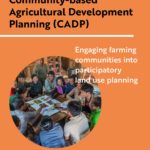
33 downloads
Title of document: EFICAS Know-How Series “Community-based Agricultural Development Planning (CADP)” Authors/editor: Jean-Christophe Castella, Pascal Lienhard, Hoa Tran Quoc, Chanthasone Khamxaykhay, Sisavath Phimmasone, Soulikone Chaivanhna, Chanthavone Phonekhampeng Journal’s name if any: Ministry/Government Agency/Organisation: EFICAS Year of publication: 2020 Geographic focus: Lao PDR Main issues/ topics addressed (for example AGROECOLOGICAL INNOVATION FARMERS OWN EXPERIMENTS ENGAGE …) School of agroecology (if any): Web address to original document (if any): Summary: An emphasis was given over the past decade to participatory land-use planning (PLUP), with strong policy support, development of methods and tools. Land-use planning has gradually improved with increased farming communities' participation and ownership of the planning process, and improved techniques for data collection and mapping. Initial participatory diagnostic usually includes an inventory and prioritization of village problems, a description of village history and demography, the identification of farming practices, of constraints to local development, as well as technical and organizational levers to improve systems performance. Unfortunately, the PLUP process usually ends with a PLUP report and map set at the entrance of the village, whereas it should be the starting point towards the effective implementation of the plan. Land use planning is not only about supporting the initial diagnosis but also about supporting the implementation of a collectively-agreed territorial plan, which still remains a challenge. Over the past 5 years, the Eco-Friendly Intensification and Climate-resilient Agricultural Systems (EFICAS) project have been working on how to translate these PLUP into action plans and notably into Community-based Agricultural Development Plans (CADPs). A CADP is an action plan: 1) that engages the whole village over several years, 2) that is negotiated and implemented by the village community and district extension agents together, 3) that (hopefully) receives the support of multiple partners/projects for implementation, and 4) that provide clear indicators to monitoring implementation and impacts. This is an adaptive learning process in which the planning, implementation, and monitoring activities are highly inter-related. This manual aims to provide field practitioners with basic information and tips on how to plan, implement, and monitor a CADP. Read More
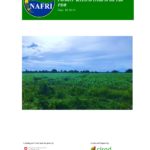
14 downloads
Title of document: Farmers’ access to credit in the Lao PDR Authors/editor: NUOL & NAFRI Journal’s name if any: Ministry/Government Agency/Organisation: NUOL & NAFRI Year of publication: 2019 Geographic focus: Lao PDR Main issues/ topics addressed (for example: …) School of agroecology (if any): Web address to original document (if any): http://laofab.org/document/view/4237 Summary: This study evaluates the access to finance of three main agriculture activities including rice, pig, and maize. The main determinants of the access to finance experience in farming, education, land size and number of workers. Farmers with at least primary school education have a higher probability of obtaining credit than those who have no school attainment. The analysis of farmer credit risk, based base on the 5 Cs principle, suggests that most farmers have a relatively high level of risk, which is likely to limit their access to credit… Read More

 Asia & Mekong Region
Asia & Mekong Region  Cambodia
Cambodia  Laos
Laos  Myanmar
Myanmar  Other
Other  Vietnam
Vietnam